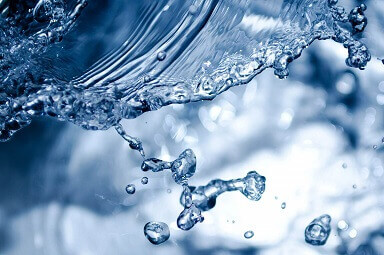Fresh Water
Choosing a Pump for Fresh Water Applications

Fresh water pumps play a crucial role in industrial, agricultural, and cooling applications, where large volumes of water need to be moved. These efficient pumps are designed to transfer water from natural sources such as lakes, rivers, reservoirs, lochs, ponds, and streams. Although water from these sources has not been purified, it is generally free from major contaminants, with minimal amounts of silt. This makes sourcing the best pump for the application a little simpler.
Main Considerations When Selecting a Fresh Water Pump
Material Compatibility
Fresh water has a low solid content which means that basic pump materials, such as cast iron are commonly used. However, if the pumping process requires that water remains stationary inside the pump for an extended period, cast iron components may cause discoloration, which could be undesirable in certain circumstances. For environments where water quality must remain pristine, stainless steel or plastic-lined pumps may be preferred.
Pump Performance & Efficiency
Fresh water typically has a specific gravity (SG) of 1, meaning it behaves similarly to standard water in terms of weight and density. This means that pumps designed for fresh water processes require standard performance specifications, without the need for heavy-duty wear-resistant components used for more abrasive or corrosive fluids.
Flow Rate & Pressure Requirements
A pump’s flow rate and pressure capacity will depend on each individual application. High-flow centrifugal pumps are ideal for large-scale abstraction, whilst positive displacement pumps may be needed for situations requiring a more precise control of flow.
Choosing the Right Fresh Water Pump for Your Needs
Selecting the right pump for fresh water applications depends on a number of criteria, such as the source of the water (e.g., river, lake, reservoir); the required flow rate and pressure based on the intended use; material compatibility to prevent water discoloration or contamination; and the energy efficiency and maintenance needs for long-term cost savings.
As a leading pump supplier and manufacturer, we offer customised solutions to suit various fresh water applications. Contact us today to find the best pump for your needs.
1. Industrial Cooling Systems
Industries such as manufacturing, power generation, and refineries all rely on fresh water pumps to cool machinery or liquid. In this scenario, water is drawn from nearby natural water sources and circulated through heat exchangers or cooling towers before being returned to the environment or reused in the process.
2. Irrigation & Agriculture
In farming and horticulture, fresh water pumps are used to distribute water to crops, greenhouses, and fields. Efficient irrigation systems ensure optimal water distribution, reducing waste and improving crop yields.
3. Water Abstraction & Transfer
Fresh water pumps are essential in municipal, industrial, and commercial applications to extract water from rivers and reservoirs. The pumps used ensure a steady and controlled flow of water for processing, storage, or further treatment.
4. Construction & Dewatering
Fresh water pumps are often used on construction sites for dewatering applications, where excess water from excavations, tunnels, and foundations must be removed to maintain safe and stable working conditions.
5. General Industrial Use
Many industrial processes require large volumes of fresh water for cleaning, mixing, or production, therefore pumps are used to move, store, or distribute fresh water efficiently within these systems.
Types of Fresh Water Pumps
Centrifugal Pumps
Best for: High-flow, low-viscosity applications like cooling and irrigation.
Key Benefits: Simple design, efficient for large-scale water transfer, and relatively low maintenance.
Submersible Pumps
Best for: Pumping water from wells, lakes, or reservoirs.
Key Benefits: Operates underwater, preventing cavitation and reducing noise.
Positive Displacement Pumps
Best for: Applications that require precise flow control, such as dosing and industrial processes.
Key Benefits: Consistent flow even under varying pressure conditions.
Self-Priming Pumps
Best for: Situations where the pump must handle air pockets, such as dewatering.
Key Benefits: Eliminates the need for manual priming, making them easy to operate.
Environmental Factors in Fresh Water Pump Selection
Environmental factors are very important when selecting a freshwater pump as they play a key role in long term performance and sustainability.
Water source conditions such as sediment, debris, and seasonal fluctuations affect pump efficiency. In these scenarios, strainers, filtration, and adjustable intake systems can help.
Variable speed drives (VSDs), solar-powered options, and high-efficiency motors can reduce energy consumption, improving energy efficiency and reducing operating costs.
Material Selection is vitally important in fresh water applications. Cast iron is a common choice, but it may cause discoloration if water is contained in the pump for long periods of time. Stainless steel or coated materials can improve water purity and durability.
If the application is operating in a region that requires WRAS approval (Water Regulations Advisory Scheme) or similar, then the pump selection need to ensure conformity with the scheme’s conditions. In the UK WRAS applies when water is taken from and returned to the public’s main water supply. To be WRAS approved, any component that comes into contact with the water needs to be rigorously tested to ensure the water being carried is not contaminated.
Equivalent Country Specific standards include NSF which is recognised globally, ACS in France, DVGW for Germany and UBA for Europe.
The application design should take into account compliance with localised water abstraction laws. Fish-friendly designs and controlled discharge prevent environmental harm and improve an organisation’s environmental credentials.
Extreme weather conditions, or with considerations for future fluctuations in temperature, pumps must be able to withstand temperature fluctuations, freezing conditions, and extreme weather for reliable operation.
By considering these factors, you can select a pump that ensures efficiency, longevity, and minimal environmental impact.
Choosing the Right Fresh Water Pump for Your Needs
Selecting the right pump for fresh water applications depends on a number of criteria, such as the source of the water (e.g., river, lake, reservoir); the required flow rate and pressure based on the intended use; material compatibility to prevent water discoloration or contamination; and the energy efficiency and maintenance needs for long-term cost savings.
As a leading pump supplier and manufacturer, we offer customized solutions to suit various fresh water applications. Contact us today to find the best pump for your needs.





